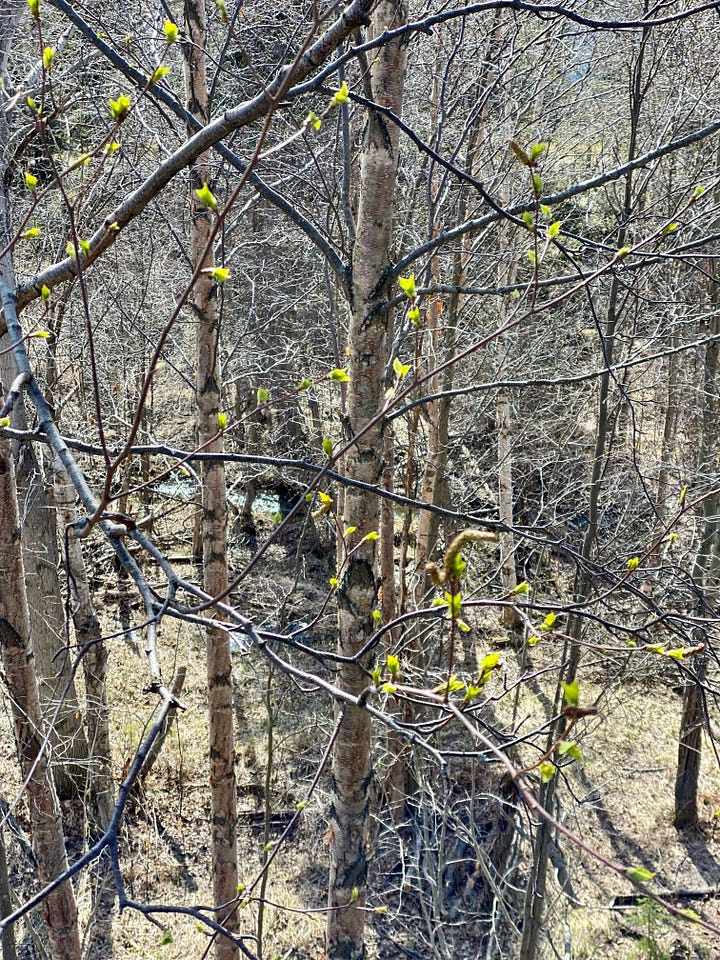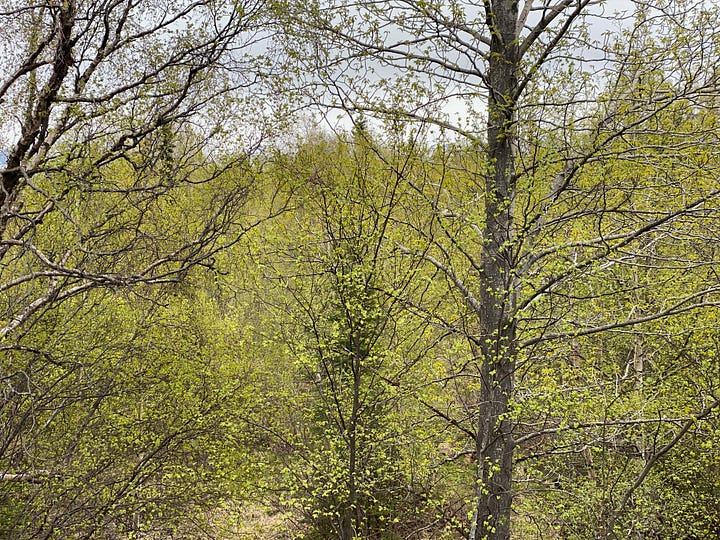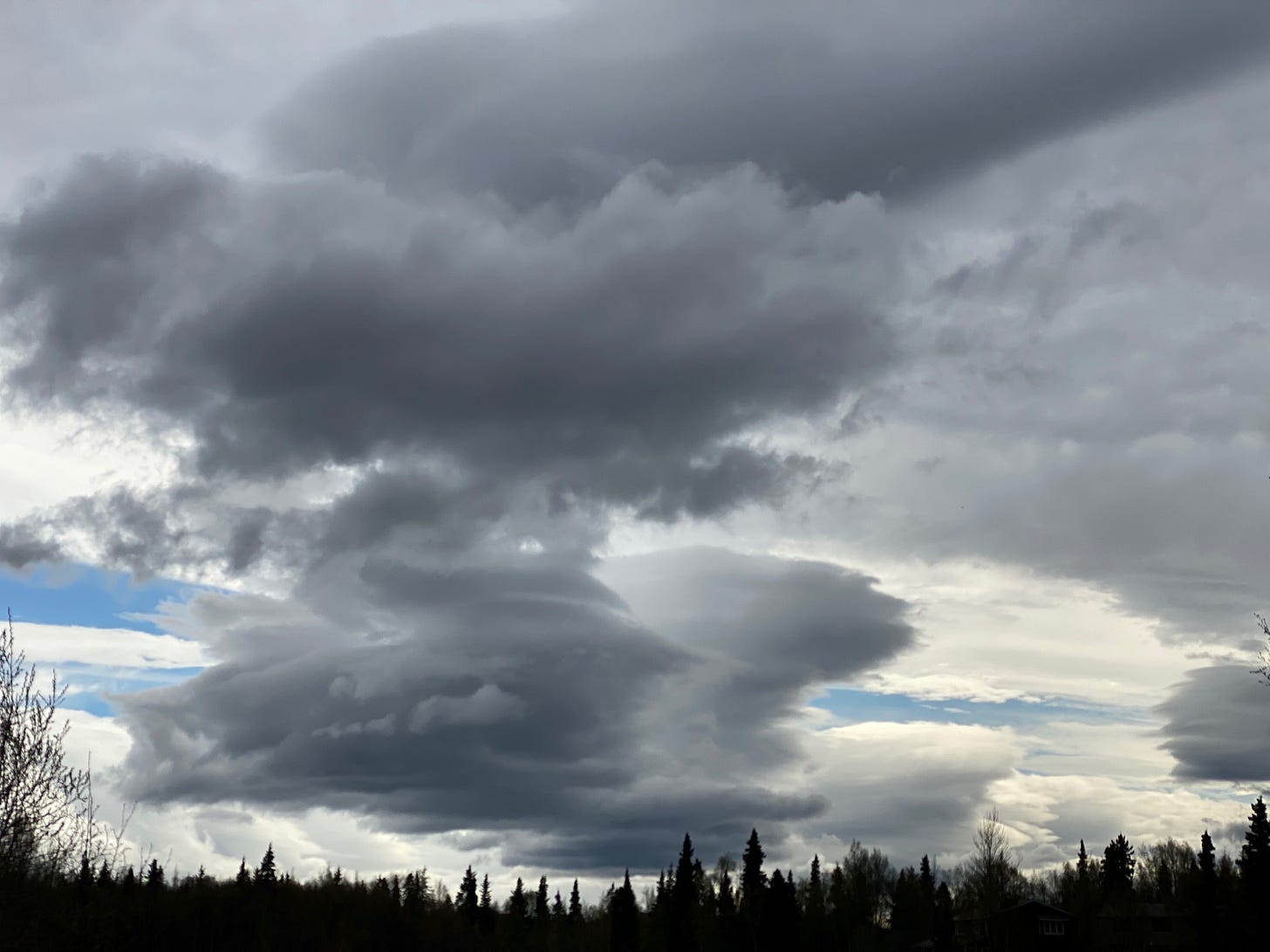To have in common
The trees have just begun bursting into green—less of a burst, more of a slow emergence—birches with small jewels of green emerging from their lacing limbs. Slowly each day they grow just a bit more, until you notice that there is actual green in the landscape, unmissable.
It honestly feels like a miracle each year—that a landscape of bare branches and so much snow and ice and gravel can slowly turn again into one that is showy with aliveness. That it might all still not happen. The winds have been gusting more than usual this past week, and each gust is a worry that the buds might change their mind, might be blown off and we will inevitably have to return to winter. But these are steady, determined leaves. It is finally, slowly their time of year.


The birds, including a handful of warblers, poofs of golden color flitting among the small leaves, begin singing at 4am—as if the world is waking together, and all of it is not about selecting a mate with the best song, or waving to pollinators to fertilize their emerging blooms, but to move in unison at the surprise of life happening again everywhere. Dandelions are so bright on southern slopes, they emerged near the warmth of the house and look as if they are sun worshippers, reflecting their god’s color back to the skies.
It makes me feel more than ever that we’re missing the entire point of being wherever we are. We should be able to spend time calling to the sun too, sitting in its new, barely-there warmth, the light’s steady persistence past 10pm, the sound of the birds calling to the trees, the light, the warmth, the green, the color that has returned to the landscape. I want to remember that we are also a part of it, not apart from it.
I read Timothy Morton’s book Humankind last week, about what the idea of humankind should, needs to encompass—of how the term itself limits and others our relationship to the world. The ideas are not new, but I love the way that he writes and thinks about them—the idea that in geologic time, for instance, rocks are liquid and move like rivers, glaciers. Does that mean they are truly inanimate? Is breath really the line in the sand that indicates what is alive, and what we might share in common?
What has stayed with me the most, however, is this paragraph in the first chapter, where Morton writes about the difficulty of writing or talking about the world as something unseparated from ourselves. And really, it’s everything—it’s why we cannot talk about others without separating ourselves from one another, without hierarchy, without division. Observation is based on exclusion—object, meet subject. He writes:
There is no pronoun entirely suitable to describe ecological beings. If I call them "I," then I'm appropriating them to myself or to some pantheistic or Gaia concept that swallows them all without regard to their specificity. If I call them "you," I differentiate them from the kind of being that I am. If I call them "he" or "she," then I'm gendering them according to heteronormative concepts that are untenable on evolutionary terms. If I call them "it," I don't think they are people like me and I'm being blatantly anthropocentric. Ironically, conventional ecological speech talks in terms of "it" and "they," abstract populations stripped of appearances. Ethical and political speech either becomes impossible or begins to sound like deeply fascist biopolitics. Humans even talk about humans that way: "the human race" is an undifferentiated "it." …I cannot speak the ecological subject, but this is exactly what I'm required to do. I can't speak it because language, and in particular grammar, is fossilized human thoughts: thoughts, for example, about humans and nonhumans. I can't say "it" as opposed to "he" or "she," as I've just argued. I can't say we. I can't say they.1
We speak a language that cements ideas—Cartesian, racist, misogynist, speciesist thinking—into maps for how to exclude. How to create object and subject. Our language is keeping us trapped in the past, repeating ideas that no longer have merit but continue to categorize, divide, and exclude.
When I was in college, it was around the time that people were first starting to recognize that a universal “he” was not so universal. That perhaps it could also be a “she” from time to time. It’s admirable, if not far too long to wait for women to be acknowledged as representing the human race in the language of hypotheticals.
I never really understood using he or man for everyone. But she didn’t feel accurate either—a nice idea, but also limiting half the population, just in the opposite direction. So in my papers, I used they if it was referring to universals, it just felt more accurate—isn’t it a you plural, if we’re intending to address everyone? For instance, “they threw the rock”—not “s/he threw the rock”? Wouldn’t it be more accurate when it comes down to it?
My professor wouldn’t have it and told me it was ungrammatically correct. End of story. I had to choose whether or not the universal hypothetical human I wrote about was either a he or she. Not plural, only singular. It was simply a fact. But honestly, to me, it felt dishonest.
This was so many years before people began to grow wiser about pronouns, about how language limits and boxes in so much of the wider population, as well as cultures and ideas. But I often think about that exchange—about what and who language serves.
Ideas of correct grammar have long been used to exclude others, to identify and deride those who haven’t learned the rules. It can perpetuate old ideas that need to die, rather than reflecting a world that wants to create a different kind of future.2 It perpetuates what we’ve been handed and told to follow—by a predominantly hierarchical, white, Western male ethos.
Why, for instance, are we so often conditioned to ask if a dog or a cat is a he or a she—is it important to correctly identify if a dog is a male or a female, other than the surgery they might need to prevent unwanted pregnancies, or how their hormones might affect their personality in different but not wrong ways? But if my dog is not a he or a she, they definitely are not an it. The birch tree outside that lives next to me each day is not an it. Are the mountains in the view of my window an it?
It’s demeaning to think of all that we’re surrounded by as some innocuous, vacant it. The stream outside that is running with new melt is not an it—a stream that moves, provides life, is part of a landscape of trees and animals and rocks. It (ugh!) is anything but it. It’s life.
Many cultures and traditions believe that language is a spell and should be treated with care. How are we caring for the language we use when it insists that individuals—or worse, a universal, individual “man"—can be a subject and that everything else is an object? Silos of individual pronouns bumping up against one another but not acknowledging a shared world—not only shared, but one that is in, of, and part of one another? How to create language that widens the spell, rather than something that limits and excludes, insists on hierarchies of being?
Morton makes the point that we are perforated beings—made up of millions of bacteria, mites, and other creatures. And so where do our bodies end and the world begins? Our bodies are worlds to some. The idea of skin as a boundary is an illusion. We are as much a part of the air we breathe as the wind gusting again through the branches outside, making its way into the crevices between the older windows of my house. To be perforated means that we are not subject, but we are something more connected, more fluid. To seek a sense of wholeness is to seek it outside as well as within. As he writes:
Worlds are perforated and permeable, which is why we can share them.3
Later, I read dg nano okapi’s book blood snow, a recent finalist for the Pulitzer Prize. okapi is originally from Alaska, grew up in Anchorage, and now lives in New Mexico. She, like the fantastic bell hooks, purposely spells her name in lowercase.
I was struck by one poem in particular—brief as a haiku, that felt like a summation of the problems that language creates—the loop it holds us in.
Light Years of Humans
*
absence/presence
may be a way
humans in deep verse
a mockingbird
tangled inside
a body
*Are we mockingbirds tangled inside a body that has been divided from the mind—repeating the language and legacies we’ve been taught, a loop that cannot absorb a new, original language—one that could allow us to emerge into a different future?
Morton writes at one point that “…individualism is a mode of traumatized survival.”4
We are trying to survive with language that reifies legacies of collective trauma, that doesn’t allow for a way to get out of the loop. By identifying ourselves only as individuals, we deny a way of seeing others, and other life, as a part of ourselves. We insist on language that keeps the lines between subject and object distinct—a dualism that keeps us isolated, and that creates the fiction of ‘nature’ being ‘out there.’
The wind stopped blowing as I write this, and the quiet is noticeable. I like that the contrast is something to notice, that there is activity and passivity and both feel equally weighted, necessary. The green leaves are moving further out of their branches, unfurling their slow blaze of green across the landscape—each leaf looks as if it is lit from within, even with the sun now clouded.
When there is life like this around us, asking to be noticed—and when is it not, really, it’s just sometimes showy, sometimes shy and quiet—I find I can’t stop thinking about it, gazing at it, being in it. We are all a part of whatever this—for truly lack of a better word—is.
This is the crux of Morton’s book that I wish could be part of a larger understanding:
Perhaps we could reimagine solidarity without having anything in common?...Or perhaps—….we could reimagine what "to have in common" means.5
What if the only grounds for “to have in common” means everything that is a part of this same planet, universe, space, whatever we need to call it. In common means that everything simply is, and is worthy of solidarity.
It’s amazing to me to think that the language and histories we are conditioned to follow work so hard to have us believe otherwise.
Morton, Timothy. 2019 Humankind. Verso Books. p. 4
To that end, it feels apposite that Star Trek famously, and defiantly, used a split infinitive—something that is more widely accepted now but used to be a sign of poor grammar: To boldly go where no man has gone before. And thankfully, Star Trek Next Generation corrected “man” to “one”: To boldy go where no one has gone before.
Morton, Timothy. 2019 Humanking. Verso Books. p. 14
Ibid, p. 165
Ibid, p. 13











I've worked as a copy editor for over 20 years, and have been having more conversations about it (partly because even among my writer friends nobody seems to understand what I do for a living) in the last year than ever before. Today I got a long response back from someone I'm interviewing for an essay about copy editing -- whom I'd asked what *good*, collaborative copy editing would look like in contrast to a bad experience -- and am left wondering if I've been doing my job all wrong. Or wrong compared to others. I can't imagine *not* using it to better "hear" an author's voice, to explore the full universes contained within every word-shape, to see what can be done with language to widen stories and understanding, but in too many instances a writer's experience is one of being put into boxes and boilerplates.
Really loved this one today, Freya. Language is at the heart of so much of how each of us is taught to see the world, especially in that separation.
Robin Wall Kimmerer gets around the idea of he/she/it/they by calling more-than-human neighbours 'kin.' The plants, the animals - all are kin. She even came up with pronoun: 'ki'. See more here: https://www.yesmagazine.org/issue/together-earth/2015/03/30/alternative-grammar-a-new-language-of-kinship